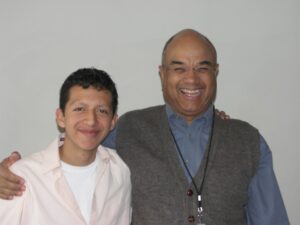Why Coaching?
A Pressing Need for More Support
- Adolescence is often a confusing time of transition, challenges, and change
- Even young people with high potential often limit their goals or become disillusioned and perplexed about their direction in life
- Many graduates lack the 21st century skills required in today’s workplace
- We are at risk of losing a generation of young adults who under-perform or drop out altogether
- Adolescents are often testing boundaries and living with emotional intensity that can affect their decision-making abilities
- Adolescence is a challenging time not to be endured but rather enjoyed and supported.
Treat people as if they were what they ought to be and you help them become what they are capable of being. —Johnn Wolfgang van Goethe
Coaching: A Ready Solution
Adolescents who have coaching do better because they:
- experience open communication, and a sense of positive connection.
- can explore more options and make better choices in a safe place.
- stretch their intellect and gain new perspectives how to “see” the world.
- develop essential life and workplace skills.
- find their own voices and truths.
- take ownership towards building their futures.
Through the power of coaching, Touch Point Connection envisions youth who become self reliant, confident and responsible, and whose contributions and choices as engaged citizens positively impact the quality of life for them and their community.
Please see the Videos menu for clips of our Volunteer Success Coaches as they share their experiences coaching teens.
Why Should Educators and Parents Care?
Coaching tools help teens get and stay on track in these ways:
- When students grab hold of their dreams and their education, teachers become facilitators of learning for engaged and eager students.
- Touch Point Connection’s coaching methodologies are adapted to the developmental levels of teens and young adults.
- Coaching provides another layer of support.
- Good parenting practices are supported by coaching.
Please view our Parents and Teachers videos here.
Why Coaching Matters to Communities with an Under-served Population
All young people can benefit from non-judgmental, goal-oriented coaching that inspires them to achieve their best. Many teens live in neighborhoods surrounded with poverty, lack of adult support, and/or unstable environments.
Typically, youth who underachieve or drop out of school are academically capable. Often, they do not reach their potential because of what happens outside of school, when their lives become overwhelming or school no longer makes sense to them.

Some adolescents live in chaos and trauma beyond our imaginations. They are overwhelmed by life, struggle with their class work, and are lacking the motivation and focus to remain interested in school. They:
- find themselves in homes filled with drugs or alcohol.
- already hold jobs to help feed the family or pay the rent.
- set no goals because they see no future.
- do not have a consistent adult in their lives to act as a “touch point” of support.
What our teens said about their coaching experience:
- “Before I had my coach, I didn’t have anyone in my life I could talk with and really trust.”
- “I know now that when I have a problem, there are more ways to solve it other than violence.”
- “I needed to talk to someone about my problems. I have my mom, but I couldn’t add my problems to all that my mom is already dealing with.”
- “Before coaching, I was getting C’s and D’s. Now I am getting A’s and B’s.”
Critical to every community’s welfare is having a majority of youth earn a formal education. The long-term cost of not supporting their education is high.
When more than 1 million students a year drop out of high school, it’s more than a problem, it’s a catastrophe.
— General Collin Powell, Former Secretary of State
To be specific:
- Most jobs that pay enough to live on require MORE than a high school diploma. An estimated 85% of current jobs and almost 90% of the fastest-growing and best-paying jobs now require a post-secondary education.
- On average, 30% of those in freshman classes in the United States does not go on to complete high school. Among those in minority groups, 42% – 47% drop out. In our largest cities, 65% – 75% may not graduate.
- Half of the students who drop out of high school NEVER work in their lifetimes.
- High school dropouts are three times more likely to have children who also drop out of high school themselves. In addition:
- EACH dropout taxes our Social Welfare system.
- If a dropout turns to crime or drugs, each one costs taxpayers an estimated: $1.7 – $2.4 million over his/her lifetime.
- More than half of all high school dropouts don’t ever work at all, costing the U.S. an estimated $260 billion in lost wages, lost taxes, and lost productivity.
- The majority of prison inmates are high school dropouts. Some states spend more funds on prisons than on schools. 75% of state prison inmates and 59% of federal inmates are high school dropouts.
- Communities suffer lost job opportunities.
- Without an educated workforce, employers move elsewhere.
- Without a good system of public education and low crime rates, employers are challenged to attract and retain a skilled workforce.
Documentation for this data can be found in the following reports:
Case for Support, Dec. 2008 – Report
High Cost of High School Dropouts – Report
For more information please visit the News, Reports & Documents section

The Value of Youth Coaching
The following outcomes were realized at Tucson’s Amphitheater High School at the conclusion of a five-year teen coaching program conducted by Touch Point Connection:
- 5-fold decease in disciplinary referrals
- 50% increase in Grade Point Averages (GPAs)
- 75% cut in absenteeism
- Students realized the relevance of their schoolwork, set goals, and learned to deal with and manage unstable lives.
My coach listened to my goals. She helped me see that what I am doing in school has a connection to what I want to do later. I didn’t see that before.


